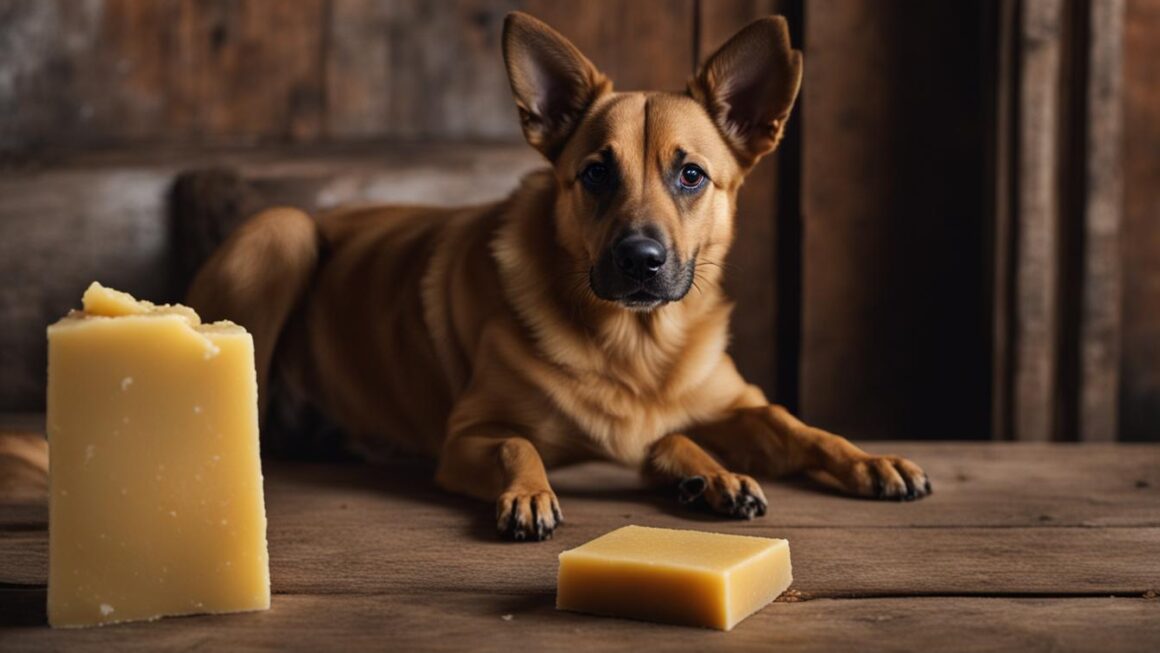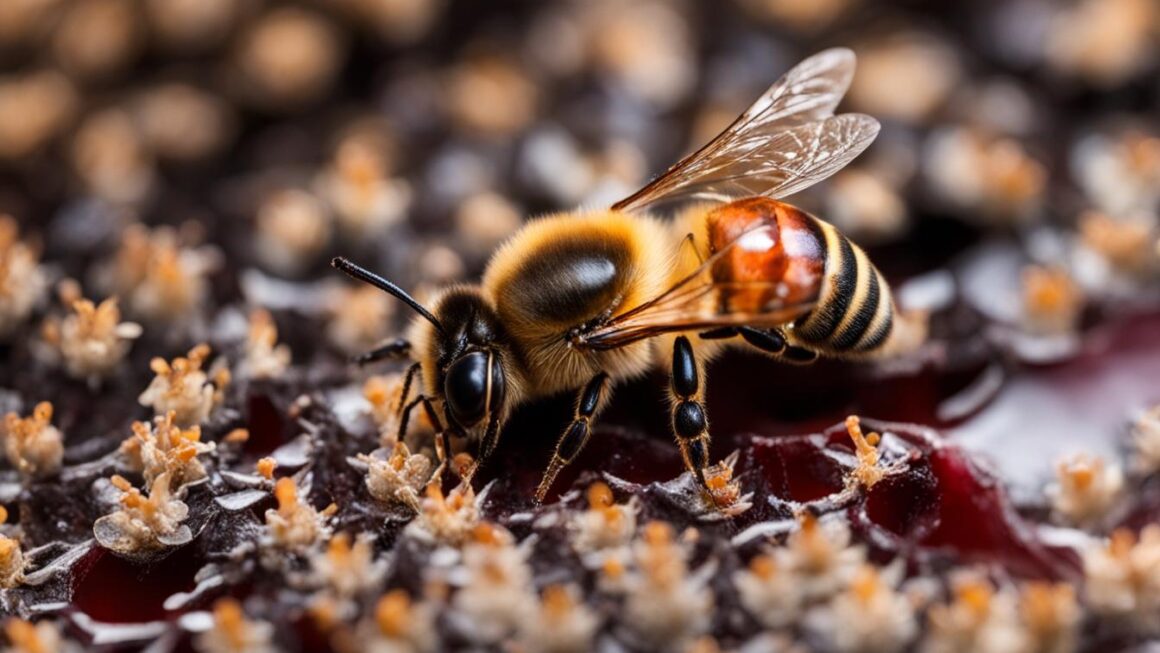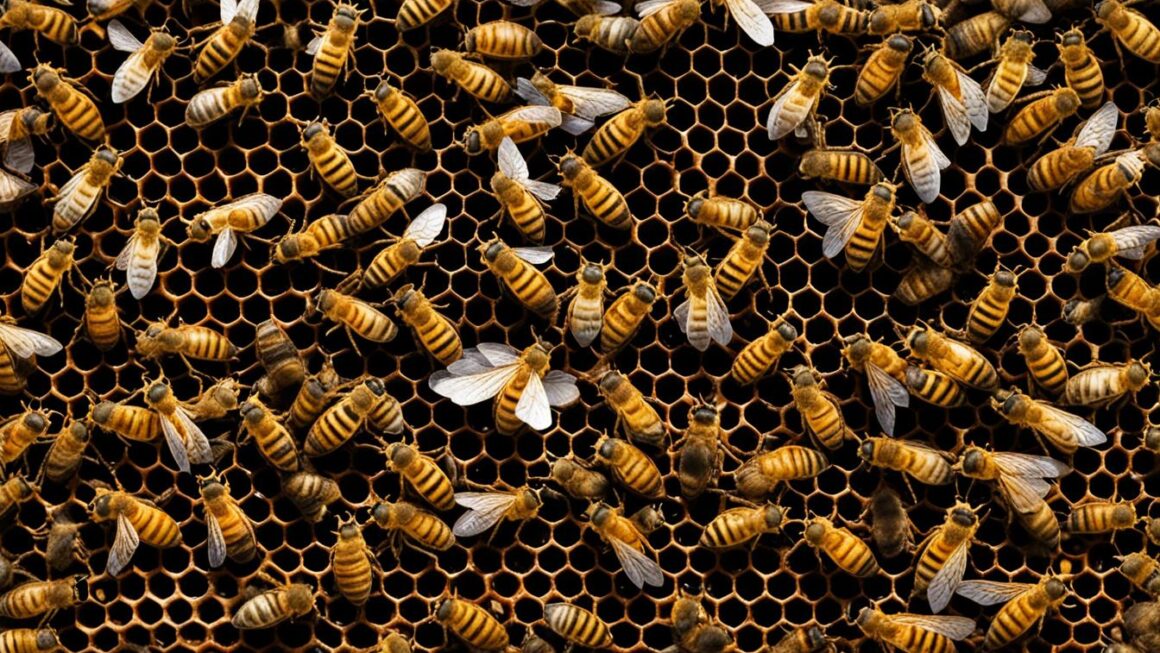As pet owners, it’s important to ensure that our furry friends are getting the best nutrition possible. Natural ingredients are often touted as a healthier alternative to artificial additives, and beeswax is no exception. But can dogs safely consume beeswax? Let’s explore the potential risks and benefits of this natural substance.
Key Takeaways:
- Beeswax is a natural substance that may offer benefits for dogs.
- There are potential risks associated with dogs consuming beeswax, including digestive issues and allergic reactions.
- Consulting with a veterinarian is crucial before introducing any new ingredient into a dog’s diet or routine.
- There are alternative natural ingredients and wax substitutes that can be used in place of beeswax to ensure the safety of dogs.
- Consider a dog’s individual needs, health condition, allergies, and dietary requirements when determining the suitability of beeswax.
Understanding Beeswax
Beeswax is a natural substance produced by honeybees. This waxy substance is secreted by the bees to construct their honeycombs. Beeswax is often used in various products, ranging from cosmetics to food, as a natural ingredient.
Is beeswax safe for dogs? While research on the effects of beeswax on dogs is limited, beeswax is generally considered safe for dogs to consume in small quantities. In fact, some pet owners use beeswax-based products to help soothe their dog’s skin and coat.
Benefits of beeswax for dogs include its moisturizing properties, which can help alleviate dry skin and promote healthy fur. Beeswax also has natural antibacterial properties and can act as a natural barrier against elements like wind and water.
Composition of Beeswax
Beeswax is composed of various fatty acids, including palmitic, oleic, and linoleic acids. It also contains natural esters and hydrocarbons, which give the wax its unique physical properties.
The color and scent of beeswax can vary depending on the source of the wax and the type of flowers the bees used to make the wax. Beeswax can range in color from pale yellow to dark brown and can have a sweet, honey-like scent.
When used in dog products, beeswax is often blended with other natural ingredients, such as coconut oil or shea butter, to create a soothing and moisturizing balm or cream.
“Beeswax has been used in various cultures for centuries as a natural ingredient with numerous benefits. When it comes to dogs, beeswax can help promote healthy skin and fur, while also providing a natural barrier against harsh environmental elements.”
Potential Risks of Dogs Eating Beeswax
While beeswax is a natural substance, it is important to be aware of the potential risks associated with allowing dogs to eat it.
One of the primary concerns is that beeswax can cause digestive issues in dogs. The substance is not easily digested and can accumulate in a dog’s digestive tract, potentially leading to blockages. This can cause severe discomfort and may require veterinary intervention.
In addition, some dogs may be allergic to beeswax. Symptoms of an allergic reaction can include itching, redness, swelling, and difficulty breathing. It is important to monitor your dog closely when introducing any new ingredient into their diet or routine.
Furthermore, beeswax can also be contaminated with pesticides or other chemicals if it is harvested from plants that have been treated with these substances. This can pose a serious health risk to dogs if ingested.
Overall, while there are potential benefits to beeswax for dogs, it is important to weigh these against the potential risks before introducing it into your dog’s diet or routine. Consult with a veterinarian to determine whether beeswax is safe and suitable for your individual dog.
Can Dogs Digest Beeswax?
Dogs have a unique digestive system that allows them to break down many types of food. However, beeswax is not easily digestible for dogs, and it may cause gastrointestinal issues if consumed in large quantities.
Beeswax is a complex substance that consists of esters, fatty acids, and long-chain alcohols. Unlike other natural fats, beeswax is not easily broken down by the digestive enzymes in a dog’s system. As a result, dogs may struggle to digest it, which can lead to constipation, diarrhea, or vomiting.
Although small amounts of beeswax are not likely to cause harm to dogs, pet owners should be cautious when introducing it into their diet. It’s important to note that the quality of the beeswax matters. Beeswax that is free from chemicals and pesticides is much safer and healthier for dogs to consume.
Tip: If your dog accidentally ingests beeswax, monitor their behavior closely. Look out for any signs of discomfort, such as vomiting or diarrhea. If you notice any concerning symptoms, consult with your veterinarian immediately.
When it comes to using beeswax in dog products, such as balms or creams, it’s important to use them cautiously. While these products may offer benefits, they should not be ingested by dogs and should be applied topically only. Pet owners should also opt for products that use natural and safe ingredients.
Bottom line: Although dogs can consume small amounts of beeswax without facing significant risks, it is not easily digestible, and it’s important for pet owners to remain cautious when introducing it into their dog’s diet or routine.
Alternatives to Beeswax for Dogs
While beeswax has some potential benefits for dogs, there are also risks associated with consuming it. Fortunately, there are numerous natural ingredients and pet-friendly wax substitutes that can be used in place of beeswax.
Coconut oil is a popular alternative to beeswax. Rich in healthy fats, it can be used to moisturize dry skin and promote a healthy, shiny coat. It is also safe for dogs to eat in small amounts.
Shea butter is another viable option. It is a natural emollient that can soothe and protect the skin while providing a rich source of vitamins and antioxidants.
Candelilla wax is a plant-based wax that is commonly used as a vegan alternative to beeswax. It has similar properties to beeswax and can be used in the same way in various pet products.
If you prefer to purchase products specifically designed for dogs, many companies offer natural waxes and balms that are safe for dogs to use. Look for products that are made from all-natural ingredients and specifically formulated for pet use.
Comparing Beeswax and Alternatives
| Substance | Properties | Potential Benefits for Dogs | Potential Risks for Dogs |
|---|---|---|---|
| Beeswax | Moisturizing, anti-inflammatory, antimicrobial | May relieve dry skin and promote healthy coat | Possible allergic reactions, digestive issues |
| Coconut oil | Moisturizing, anti-inflammatory, antifungal | May relieve dry skin, promote healthy coat and digestion | May cause digestive upset in large quantities |
| Shea butter | Emollient, anti-inflammatory, antioxidant | May soothe and protect the skin while providing essential nutrients | Possible allergic reactions, digestive issues |
| Candelilla wax | Emollient, hypoallergenic, antimicrobial | May moisturize and protect the skin while acting as a natural barrier | Possible allergic reactions |
It’s important to note that while these alternatives may have similar properties to beeswax, they may not provide all of the same benefits. It’s always best to consult with a veterinarian before introducing any new ingredients into your dog’s diet or routine.
Exploring Dog-Friendly Natural Ingredients
While beeswax may offer some potential benefits for dogs, it’s important to consider alternative natural ingredients that can serve as safe and healthy substitutes. Here are some dog-friendly natural ingredients to consider:
- Coconut oil: This multi-functional ingredient can serve as a substitute for beeswax in moisturizing and soothing dog skin. Its antibacterial properties can also aid in treating minor wounds and irritations.
- Shea butter: A natural emollient, shea butter can provide skin with moisture and hydration and can be a great alternative for dogs with dry or irritated skin.
- Olive oil: In addition to being a healthy ingredient in a dog’s diet, olive oil can also be used topically to soothe dry or itchy skin.
- Baking soda: This natural ingredient can be helpful in treating a variety of dog skin conditions, including insect bites and hotspots. It can also be used as a natural deodorizer for dogs with odorous coats.
- Aloe vera: This plant-based ingredient can help soothe and heal skin irritations and minor wounds.
These natural ingredients can be used individually or in combination to create homemade remedies or incorporated into commercial dog products as safe and healthy alternatives to beeswax.
Beeswax Products for Dogs
While beeswax can pose potential risks for dogs if consumed, it can also be used safely and effectively in certain products, such as balms and creams. These products can provide moisturizing and protective benefits for a dog’s skin and coat, making them an attractive option for pet owners.
It is important to note, however, that not all beeswax products are created equal. Some may contain additional ingredients that could cause harm to a dog, so it is crucial to thoroughly read and understand product labels before use.
In addition, it is recommended that pet owners introduce beeswax products gradually and in small amounts, monitoring their dog closely for any adverse reactions. If a dog shows signs of discomfort or allergies, discontinue use immediately and consult with a veterinarian.
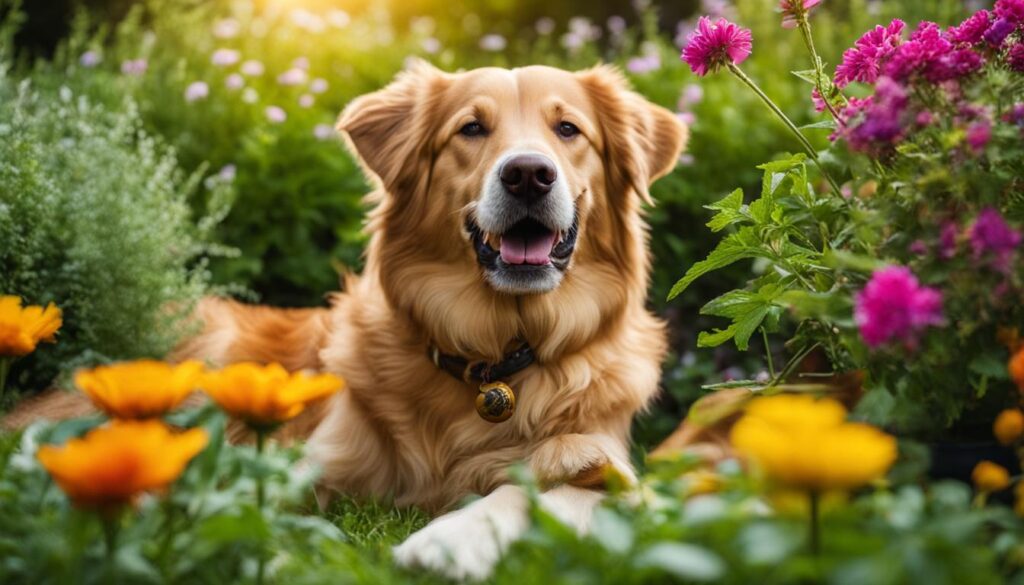
Example of Beeswax Products for Dogs
| Product | Description | Ingredients |
|---|---|---|
| Paw Balm | A balm designed to protect and moisturize a dog’s paws, formed from natural ingredients and beeswax. | Beeswax, coconut oil, shea butter, jojoba oil, vitamin E oil |
| Nose Balm | A balm designed to protect and moisturize a dog’s nose, formulated with natural ingredients and beeswax. | Beeswax, coconut oil, shea butter, jojoba oil, vitamin E oil, lavender essential oil |
| Coat Conditioner | A conditioner designed to nourish and protect a dog’s coat, made from all-natural ingredients and beeswax. | Beeswax, coconut oil, sweet almond oil, lavender essential oil, peppermint essential oil |
Tip: When using beeswax products for dogs, it is important to ensure they are made from all-natural ingredients and contain no additives or preservatives that could be harmful to a dog’s health.
Beeswax in Commercial Dog Products
Beeswax is a popular ingredient in many commercial dog products, including treats, grooming supplies, and balms. While this can be an indication of its potential benefits, it is important to note that not all products are created equal. Owners should always read labels and do their research to ensure that the products they are using are safe and suitable for their dogs.
Some products may contain higher concentrations of beeswax than others, or may be combined with other ingredients that could be harmful to dogs. Additionally, some dogs may be allergic to beeswax or other ingredients commonly found in these products, such as essential oils or fragrances.
To ensure the safety of your pet, it is recommended to consult with a veterinarian before using any new product on your dog. They can help you determine whether a product is safe for your dog’s individual needs and provide guidance on how to use it properly.
If you do choose to use a beeswax-based product on your dog, it is important to monitor them closely for any signs of adverse reactions. This can include vomiting, diarrhea, rash, or difficulty breathing.
Ultimately, while beeswax can offer potential benefits for dogs, it is important to approach its use with caution and to consider the individual needs of your pet. By doing your research and consulting with a veterinarian, you can ensure that you are making informed decisions about the products you use on your furry friend.
Benefits of Beeswax for Dogs
While there are potential risks associated with dogs consuming beeswax, there are also some potential benefits that pet owners may want to consider. Here are some of the potential benefits of beeswax for dogs:
- Moisturizing properties: Beeswax is known for its moisturizing properties, which can be beneficial for dogs with dry or cracked skin. It can help soothe and soften their skin, as well as provide a protective barrier against further damage.
- Paw protection: Beeswax can be used to create a protective barrier on your dog’s paws, which can help prevent damage caused by rough surfaces, hot pavements, or winter weather conditions. It can also help soothe cracked paw pads and promote healing.
- Natural ingredient: Beeswax is a natural, non-toxic ingredient that can be a safer alternative to synthetic ingredients in some dog products. It can provide similar benefits without the potential risks associated with synthetic ingredients.
However, it is important to note that the benefits of beeswax for dogs have not been extensively researched, and there is limited scientific evidence to support these claims. As with any new ingredient, pet owners should consult with their veterinarian before using beeswax on their dog to ensure it is safe and appropriate for their individual needs.
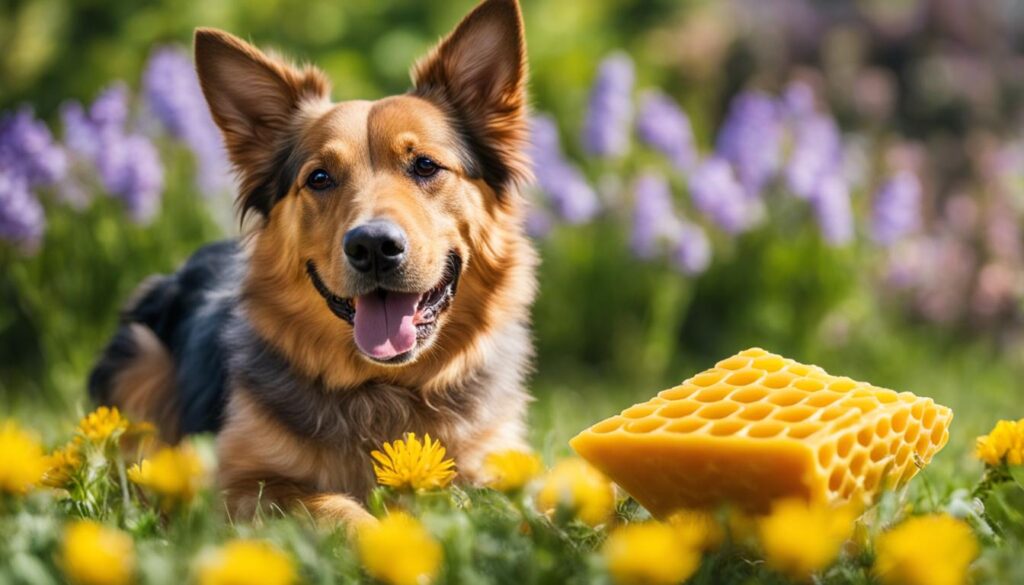
The Importance of Consultation
When it comes to introducing new ingredients or products into a dog’s diet or routine, it is essential to consult with a veterinarian to ensure their safety and suitability. This is especially important when considering the use of beeswax in any form.
While beeswax may have potential benefits for dogs, such as its moisturizing properties and soothing effects, it is important to consider the individual needs of each dog. Dogs with allergies or sensitive digestive systems may be more prone to adverse reactions or digestive issues if they consume beeswax.
In addition, the use of beeswax in commercial dog products, such as treats or grooming supplies, may also pose potential risks if used incorrectly or without proper consultation. Always read labels carefully and consult with a veterinarian before using any natural wax products on your dog.
In summary, while beeswax may be safe and beneficial for some dogs, it is important to approach its use with caution and to consider the unique needs of each individual dog. Consulting with a veterinarian is the best way to ensure the safety and suitability of any new ingredient or product in your dog’s life.
Considering Your Dog’s Individual Needs
While beeswax may be safe for some dogs to consume in small amounts, it’s important to consider your furry friend’s individual needs before incorporating it into their diet or grooming routine.
If your dog has a sensitive digestive system, a history of allergies, or is currently taking medication, it may be best to avoid feeding them beeswax or using products that contain this natural substance.
Additionally, some dogs may simply not enjoy the taste or texture of beeswax, and forcing them to consume it may cause unnecessary stress or discomfort.
If you are considering introducing beeswax into your dog’s routine, it’s always a good idea to consult with your veterinarian first. They can provide personalized recommendations based on your dog’s health history, dietary needs, and other factors to ensure that beeswax is safe and suitable for your furry friend.
Expert Tip:
“While beeswax can offer some benefits for dogs, it’s important to remember that every dog is different. Before introducing any new ingredient or product into your dog’s routine, consult with your veterinarian to determine whether it’s safe and appropriate for your furry friend.”
-Dr. Sarah Johnson, DVM
Conclusion
In conclusion, while beeswax may offer some potential benefits for dogs, it is important to approach its use with caution. While it is generally considered safe for dogs to consume in small amounts, it may pose risks for some dogs, particularly those with allergies or digestive issues.
Before introducing beeswax into a dog’s diet or routine, it is crucial to consult with a veterinarian to ensure that it is appropriate for their individual needs. Additionally, pet owners can explore alternative natural ingredients and wax substitutes that may offer similar benefits without the potential risks.
When it comes to using beeswax products for dogs, such as balms and creams, it is essential to use them cautiously and follow product instructions carefully. It is also important to be aware of the prevalence of beeswax in commercial dog products and to read ingredient labels carefully to ensure the safety of your pet.
Ultimately, the decision to incorporate beeswax into a dog’s routine should be based on careful consideration of their specific needs and potential risks. By taking these factors into account and consulting with a veterinarian, pet owners can make informed choices to support their dog’s health and well-being.
FAQ
Can dogs safely consume beeswax?
While small amounts of beeswax are generally considered safe for dogs, it is important to monitor their consumption and watch out for any adverse reactions.
What is beeswax and what are its benefits for dogs?
Beeswax is a natural substance produced by bees. It can provide moisture to the skin, acts as a protective barrier, and may have soothing properties for dogs’ paws and noses.
What are the potential risks of dogs eating beeswax?
Dogs may experience digestive issues or allergic reactions if they consume excessive amounts of beeswax. It is important to consult with a veterinarian if any concerns arise.
Can dogs digest beeswax without any issues?
In general, dogs can digest beeswax without any major problems. However, excessive consumption or pre-existing gastrointestinal issues may cause digestive disturbances. Monitor their intake and consult a vet if needed.
Are there any alternatives to beeswax for dogs?
Yes, there are alternative natural ingredients and wax substitutes that can be used instead of beeswax. These alternatives can provide similar benefits without the potential risks.
What are some dog-friendly natural ingredients?
Some dog-friendly natural ingredients include coconut oil, shea butter, and olive oil, which can offer similar benefits as beeswax and are safe for dogs to consume or apply topically.
Are there beeswax products specifically made for dogs?
Yes, there are beeswax-based products such as balms and creams that are formulated specifically for dogs. These should be used cautiously and according to the product instructions.
Is beeswax commonly found in commercial dog products?
Beeswax can be found in some commercial dog products, such as treats and grooming supplies. It is important to read the ingredients carefully and consider the potential implications for your dog.
What are the benefits of beeswax for dogs?
Beeswax can provide moisturizing effects and act as a protective barrier for dogs’ skin. It may also have soothing properties for their paws and noses.
Is it important to consult with a veterinarian before using beeswax for dogs?
Yes, it is crucial to consult with a veterinarian before introducing beeswax or any new ingredient into a dog’s diet or routine. They can provide personalized advice based on your dog’s specific needs.
What factors should be considered when determining the suitability of beeswax for dogs?
When considering the suitability of beeswax for dogs, it is important to take into account their individual health conditions, allergies, and dietary requirements. This will help ensure their safety and well-being.

